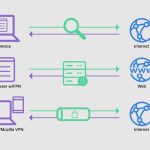VPN and Proxy: What’s the Difference?
As an Internet user, you might come across these services or even know about the pros of each of them. It is vital to understand the difference between a VPN and a proxy so you can choose a service that meets your requirements. We’ve made a detailed guide that will help you determine what service is the best for you.
What is a Proxy?
For those who are familiar only with free VPN for torrenting, a proxy server is the one that operates as a mediator for requests from clients looking for resources on other servers. To cut it short, it is a software installed on a PC that mediates communication between the target device and another server from which the user requests a service.
A proxy can run on the same PC as the firewall, or on a separate server that redirects requests through the firewall. In simple words, a proxy can be considered as a system that redirects your activity in the browser. Usually, when you open a website from a home PC, the provider processes the request for access to this site, connecting you to this platform.
Considering the mentioned above, we can predict possible situations in which the proxy is useful:
- To overcome firewall restrictions;
- When you need to privately and safely use certain sites, making sure your location and IP address are not disclosed;
- When traveling to countries where access to certain websites is restricted;
- If necessary, open various sites as if from another country.
What is a VPN?
VPN is the expansion of a private network within a public one, which allows users to send and receive data through public nets as if their devices were directly connected to a private one.
The operation of a virtual private net is carried out through a global network, which means that it does not need to have a physical location, as with a LAN network. What makes the VPN virtual and private is the use of encryption and other security measures that allow you to classify the data held through it.
A VPN usually acts as an intermediary between you and your ISP. Your Internet traffic is redirected through a remote server, which, in turn, hides your IP from sites, and also encrypts all data transmitted from the device to the World Wide Web and vice versa. So, the main difference between VPN and Proxy is encryption, which protects all your data on the Internet. https://surfshark.com/blog/vpn-vs-proxy
What is the Difference Between VPN and Proxy?
Although it may seem that the purpose of these services is the same, they work a bit differently.
Both the VPN and the proxy server allow you to access any resource on the Internet without revealing your real IP address and location to these sites. The main difference is the level of security. Both services hide your IP address and personal data, however, only the VPN protects it with encryption.
Which service do you prefer? Tell us in the comments.



